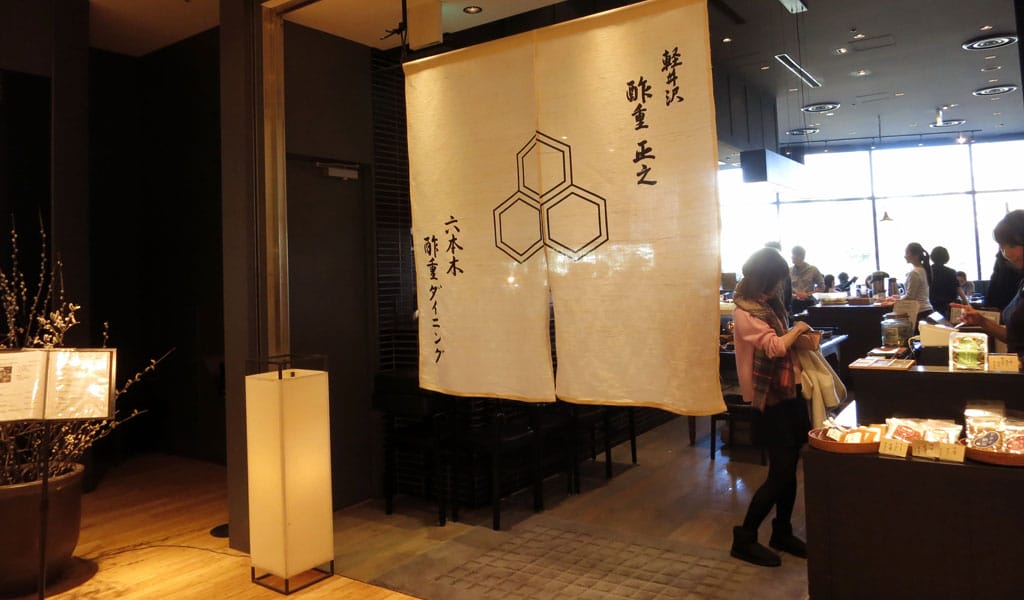We are sitting under the tonic canopy of an enormous pine tree in a hidden Tbilisi garden, licking our lips over menu items that are neither European nor Georgian. When our dining companion informs us she will not share her trout tartare with adjika (highly concentrated spicy red pepper paste), we realize there will be no plate-dipping tonight. Just as we settle on our main courses, a woman in a blue chef’s jacket comes up to our table, beaming bonhomie, and asks if she can help us in any way. This is Tekuna Gachechiladze, the blue-eyed Tbilisi chef dedicated to changing the way Georgians understand their food culture. We are sitting at her latest culinary venture, Cafe Littera.
The setting couldn’t be more appropriate. At the turn of the 20th century, philanthropist and father of Georgian brandy David Sarajishvili hired a German-Georgian team of architects to build a house to commemorate his 25th wedding anniversary. Located in the heart of Tbilisi’s Sololaki neighborhood, this remarkable Euro-Georgian Art Nouveau creation would become the center of the capital’s cultural life for the next 100 years. Today it is known as the Writer’s House of Georgia, and its lush courtyard garden is where Tekuna has chosen to revive Georgia’s culinary legacy, which had been an evolving marriage of cultures until the Communists arrived and forcibly inundated the country with their version of tradition.
“Old Georgian cookbooks are full of French recipes. In the 19th century, every housewife in Georgia made béchamel sauce,” Tekuna says.
The Communists favored Georgian peasant dishes, which are the staples of the local diet today. Any tampering with this food will provoke severe castigation from many Georgians, who consider modifications to their national dishes an offense to their cultural identity. It doesn’t matter that khinkali came from Central Asia and primary ingredients like corn and pomegranates come from North America and Persia, respectively. To these xenophobes, Georgian cuisine is holy like Georgian Christianity and must be preserved, not altered. They view Tekuna with her innovations as a threat to Georgia’s ancient traditions, while she sees herself as someone who is maintaining Georgia’s multicultural traditions.

“I like mussels but I don’t really like parsley, so I thought, ‘Chakapuli has tarragon, sour plums and white wine. Why not substitute mussels for the meat?’”
The result is rich, piquant and strictly Georgian excellence. Tekuna’s “why nots” have led her to stuff zucchini flowers with mint and nadugi (a local creamy cheese) and to substitute jonjoli (local bladdernut seed pods) for capers in her meat tartare. While other dishes – like seared tuna sesame with French beans and chili sauce – are unabashedly non-Georgian, the dining manner is.
Slow Food might be a movement in the west, but in Georgia, where a single dinner can last into the wee hours of the morning, it is inherent to the lifestyle. Tekuna nurtures this tradition by preparing each dish to order, including the meat-cutting and sauce-making. She personally welcomes each guest to enjoy the experience with her warm, natural charm, although we need no coaxing in this seductive garden as we sip cool wine on a hot summer night. There is little table turnover at Cafe Littera.
Tekuna’s stellar cooking career is the result of an adventitious chain of events that brought her to New York City, where she dropped out of her doctorate program in psychology and signed up for cooking school. She returned to Tbilisi in 2006, eager to do something “revolutionary” in a country where the menu in each and every restaurant was the same. She started at a French restaurant, moved on to American and then explored the possibilities of fusing Asian with Georgian, winning over former President Mikheil Saakashvili, who saw how her cooking complemented his vision of a modern country. “Misha,” as he is called in Georgia, often called on Tekuna to prepare her takes on Georgian food for visiting dignitaries. Two and a half years ago, she opened a 30-seat restaurant, Culinarium, the first exclusively chef-owned restaurant in Tbilisi, which is her laboratory for new ideas, and she also hosts a weekly cooking show on TV.

Tekuna’s artistry has garnered her the title “Queen of Georgian Fusion,” a moniker she eschews with a slight blush and roll of the eyes. “I don’t like the word ‘fusion.’ I make modern Georgian food,” she says. While there are others in the country pushing the limits of Georgian cuisine, Tekuna’s consequential influence is unquestionable. Her students are opening restaurants and teaching at Tbilisi’s only accredited cooking school, while Georgian housewives are doing things like turning their tired beef stews into boeuf bourguignon and transforming the domestic palate.
“It’s slowly changing. A lot of young people are learning to cook, traveling and tasting different things. Twenty years ago, it was much different. It needs time to develop. I’m sure in 10, 15 years Georgian cuisine will be more vibrant, more alive than 10 years ago. That’s my hope and dream,” Tekuna says.
 December 5, 2018 Breakfast on the Go in Athens
December 5, 2018 Breakfast on the Go in Athens
Greeks are not a nation of breakfast eaters, so koulouri, a plain, circular bread topped […] Posted in Athens January 25, 2024 A Regaleira
January 25, 2024 A Regaleira
“Bom filho à casa torna,” we like to say in Portuguese, a maxim that translates to “a […] Posted in Porto June 14, 2021 Suju Dining Rokkaku
June 14, 2021 Suju Dining Rokkaku
Many people think of miso as the soup that gets tacked onto every Japanese meal. We can […] Posted in Tokyo
Published on August 18, 2015
Related stories
December 5, 2018
Athens | By Culinary Backstreets
AthensGreeks are not a nation of breakfast eaters, so koulouri, a plain, circular bread topped with sesame seeds, tends to be the morning fare of choice for most people. There is something seriously sweet and fresh about these bread rings, which are sold on most street corners in downtown Athens and are a guaranteed encounter…
January 25, 2024
Porto | By Cláudia Brandão
Porto“Bom filho à casa torna,” we like to say in Portuguese, a maxim that translates to “a good son comes home.” Can the saying be applied to a sandwich? In Porto, we would argue, the answer is yes, especially now that A Regaleira, the birthplace of the francesinha – Porto’s signature dish – is open…
June 14, 2021
TokyoMany people think of miso as the soup that gets tacked onto every Japanese meal. We can still remember our first experience of Japanese food in the West, when the waiter brought the soup at the end of the meal, and someone thought he’d forgotten to serve it at the beginning. Any self-respecting Japanese meal,…



















































































